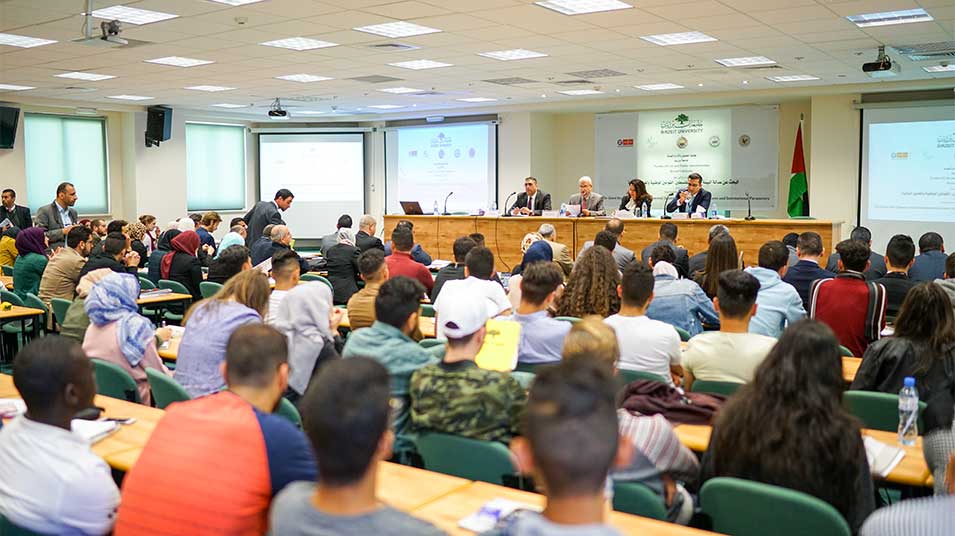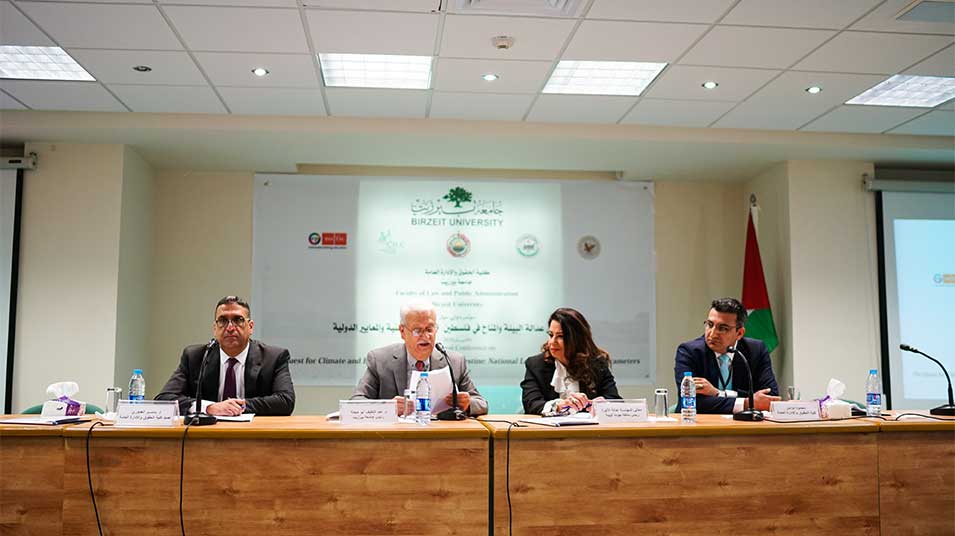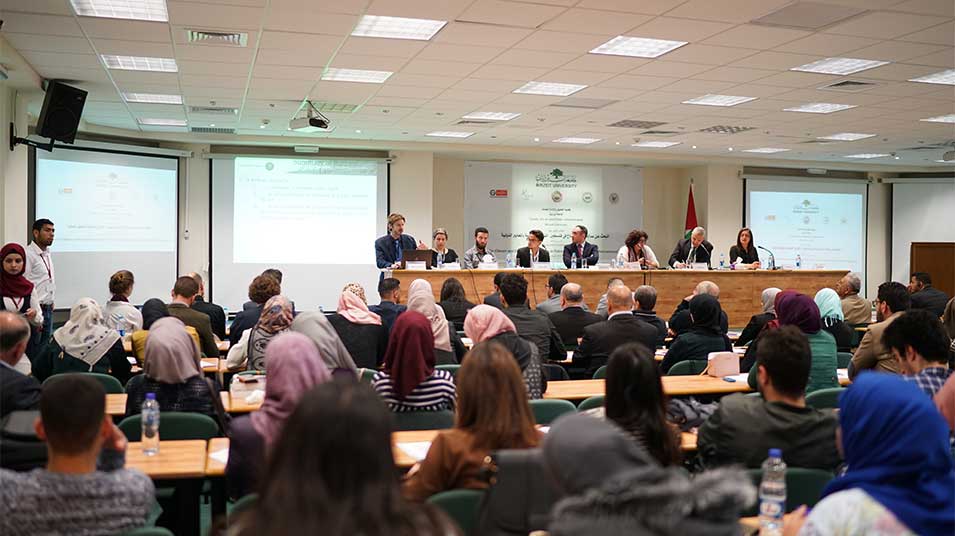International conference on Palestine’s climate, environment lays the groundwork for a better future
Palestinian and International legal experts, government officials, and academics explored the legal and regulatory frameworks concerning Palestine’s climate and environment in the Faculty of Law and Public Administration’s annual conference, entitled “The Quest for Climate and Environmental Justice in Palestine: National Laws and International Parameters,” on April 4, 2018.
The conference, held on Birzeit University’s campus, featured President of Birzeit University Abdullatif Abuhijleh; Chair of the Palestinian Environment Quality Authority Adala Atira; and Dean of the Faculty of Law and Administration Yasser Amouri.
The conference’s main themes revolved around environmental justice in the Palestinian context, which included key issues such as civil and criminal liability, compatibility of national laws with international standards, alternative energy and sustainable development, environmental adaptation, and mitigation and reduction of climate change effects.
Additionally, the conference focused on climate and environmental justice issues from an international perspective, such as the environment and human rights, trans-border environmental damage and state purview, international environment agreements and covenants, Palestine’s international climate and environmental obligations, Israeli violations of environment in the occupied Palestinian territories in the purview of international law, and climate change and natural resources.
Abuhijleh stressed the importance of climate and environmental justice, both locally and internationally. “We believe that universities are the tools of change in societies and play a key role in inspiring and renewing discussions on public issues. Universities should significantly figure in the development of the Palestinian community and take on major roles in conserving and preserving the sustainability of its resources.”
“Birzeit University,” Abuhijleh added, “out of its belief in the connection between environmental practices and climate change, places significant attention on the environment and its various facets. As such, the university encourages environmental scientific research and has established a specialized institute for that purpose in 2001, the Institute of Environmental and Water Studies, which offers two master’s programs in water and environmental engineering and water and environmental sciences.”
“While the environment and climate change are now an international concern at the highest levels – considering that it’s directly connected to the availability of our collective natural resources – the presence of the Israeli Occupation makes it a much more pressing concern here in Palestine. The Occupation not only kills our sons and daughters and steals our lands and resources, but also violates the Palestinian environment and fills ours lands with solid waste.”
Atira highlighted the measures taken by the Environment Quality Authority to support the Palestinian environment. “One of the most important goals of the National Environmental Strategy was reaching out to the international community, not only to cement the political and legal standing of the State of Palestine, but also to take advantage of the legal, financial, and technical mechanisms provided by international organizations. Such measures allow us to counter the continuous Israeli violations of our environment.”
The annual conference, noted Amouri, is part of the Faculty of Law and Public Administration’s mission and values. The faculty, he said, strives to serve the Palestinian community and provide public, private, and non-profit organizations with the knowledge and specialized skills needed to produce a generation that works for a brighter Palestinian future, one built on respect, equality, and justice.
Amouri also expressed his gratitude to the Dutch government, which provided funding for the “Capacity Building in Higher Legal Education” project – one of its outcomes being this annual conference. “The Dutch government contributed to the building of the capacities of some of our faculty members by organizing specialized training courses, both here in Palestine and abroad, in addition to offering our instructors and teachers Ph.D. scholarships and funding the conference room, the mock court, and the legal clinic in the recently-established Riad Tawfik Al-Sadik Faculty of Law and Public Administration.”
Mohammad Alqaisi, conference chair and professor of law at Birzeit University, commented on the objectives of the conference, saying, “The conference aims to establish climate and environmental justice in Palestine by shining a light on the environmental realities here; addressing the roles of regulations; and providing a space for academics, experts, and officials to explore and discuss solutions to the obstacles and challenges currently stopping us from achieving environmental justice.”
The conference featured environmental and legal specialists and academics, such as Abdullah Dodeen, Otto Spijkers, Ahmad Beshtawi, Walid Qarra, Norhan Barahmah, Rawan Nu’eirat, Ahmad Nue’irat, Mu’ath Al-Madmouj, Nihad Khanfar, Rashed Al-Sa’ed, Hadi Al-Shid, Ikram Ziyadeh, Noura Taha, Reem Butmeh, Suha Jarrar, Tasneem Kahlah, Samer Najm Al-Din, Murad Al-Madani, Yusra Hassouneh, Samar Al-Damanhouri, Suhaib Sakran, Noor Jaber, Noor Al-Kharouf, Mustafa Abdul Baqi, Mahmoud Abu Sawi, Jihad Al-Kiswani, Najah Duqmaq, Ala’ Al-Khalayleh, Abeer Dirbas, Omar Ureiqat, and Yousef Shandi.









